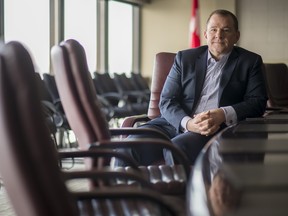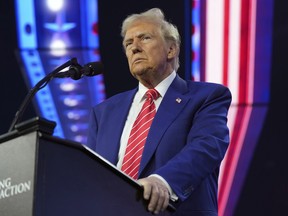Even if Matthew Boswell loses his fight to block the deal, it could help bring about meaningful changes to Canada’s competition rules
Article content
Matthew Boswell, the federal competition watchdog who’s trying to block one of the biggest corporate mergers in recent history, could win even if he loses.
Advertisement 2
Article content
On the surface, Boswell’s attempt to block Rogers Communications Inc.’s $26-billion takeover of Shaw Communications Inc. looks like an easy win, the kind of amalgamation that regulators such as the Competition Bureau were created to prevent.
Yet Boswell could lose. His legal challenge could grind its way through the federal competition tribunal for years and fail. Many on Bay Street continue to assume the Rogers-Shaw deal will go ahead, despite Boswell’s surprise intervention after markets closed on May 6.
The companies said they now simply expect the deal will close in July instead of June.
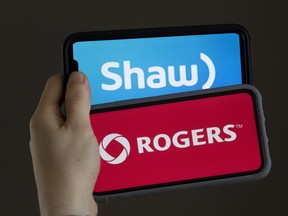
But if that happens, it could help bring about some of the most meaningful changes to Canada’s competition rules in decades. In his three years running the Competition Bureau, Boswell has emerged as an outspoken critic of the Competition Act — the law he happens to be in charge of enforcing. He says the rules are out of step with the digital age, and too soft to stop mergers from choking competition and hurting consumers.
Advertisement 3
Article content
So, if he can’t manage to use the existing legal system to stop what he believes is a bad merger, he could end up proving his own point, while generating political pressure to make the changes he’s been pushing.
“If he loses, it’s just a damning indictment of the system,” said Jennifer Quaid, vice-dean of research and associate professor who specializes in competition law at the University of Ottawa. “That will be the most damning indictment of the merger provisions to date.”
If he loses, it’s just a damning indictment of the system
Jennifer Quaid, University of Ottawa
To be sure, a damning indictment alone won’t guarantee better rules, Quaid said. But the Rogers-Shaw case is getting the type of broad public attention not normally given to merger reviews at the tribunal. Boswell argues that the combination will lead to increases in prices for wireless service, which many Canadians equate to an essential service. If the tribunal decides against Boswell, in front of a national audience that pays some of the highest costs for cellphone service on the planet, then it could spark enough public backlash to force sweeping changes to the way Canada treats merger cases.
Advertisement 4
Article content
“People intuitively understand that there’s a size and scope issue here with this proposed merger and they’re feeling frustrated,” said Vass Bednar, executive director of McMaster University’s master of public policy program. “People have been expressing that, which has created more political pressure.”
‘Cowboy commissioner’
The bureau’s move to block the merger comes as the Trudeau government is contemplating changes to the Competition Act. The federal budget proposed a series of amendments to fix perceived loopholes in the law, while also committing to a broader review of the entire legislation.
It’s not yet clear what will come of the legislative review, but Boswell’s camp has been pushing for a controversial change to the legislation that could reshape the fundamental purpose of Canada’s competition law, according to Michael Osborne, a partner who focuses on competition law at Cassels Brock & Blackwell LLP.
Advertisement 5
Article content
“Boswell likes to talk tough. He’s, you know, kind of the cowboy commissioner,” Osborne said.
Tough talk in the world of competition policy is prepared remarks and written submissions, including a 26-minute, pre-taped speech that Boswell delivered to a virtual conference of Canadian competition lawyers last fall. Some considered that speech to be the harshest language from a competition commissioner in more than a decade, partly because of Boswell’s controversial stance against what is known as the “efficiencies defence.”
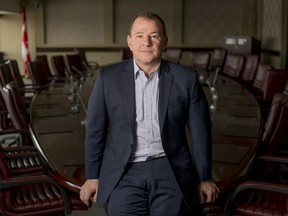
The efficiencies defence is essentially a trump card for companies seeking to gobble up smaller rivals. If the efficiencies achieved from the merger — layoffs, for example — will outweigh the negative effects on competition, then the deal is allowed to go through.
Advertisement 6
Article content
Rogers, for one, has said it expects the merger to create $1 billion in synergies.
But a policy battle over the efficiencies defence is a much bigger deal than it sounds. The defence reflects a core belief that Canada should give its domestic businesses enough regulatory breathing room to reach the size and scale that allows them to compete on the global stage, even if it means sacrificing consumer choice. So challenging the defence could mean redefining exactly what Canada wants out of its competition law.
“It’s a very fundamental question, which is: What is the act for?” Osborne said. “As it’s currently structured, efficiency trumps competition. So that’s arguably its main goal.”
Fight for Freedom
But even with all the current context in the competition policy world, the bureau’s move to block the Rogers-Shaw deal could also be seen as simply the natural next step in a case where the parties are at an impasse. “That’s not necessarily a bad thing for Rogers and Shaw either,” Osborne said. “It means they can make use of the tribunal’s mediation service, which allows an independent look at the case. And it could help resolve the log jam.”
Advertisement 7
Article content
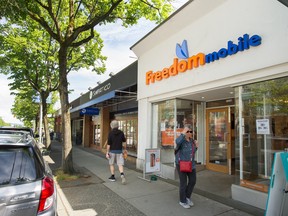
In public statements this week, the Competition Bureau argued the merger will stop Shaw from playing the role of disruptor to Canada’s highly concentrated wireless market, where Canadians pay “some of the highest prices for wireless services in the developed world.” The bureau credited Shaw’s wireless provider, Freedom Mobile, for forcing Rogers, BCE Inc.’s Bell Canada, and Telus Corp. to lower their prices in order to stay competitive.
“Removing a strong regional competitor like Shaw will likely result in consumers paying significantly higher prices,” the bureau said in a statement on May 9.
Rogers and Shaw said they’re still committed to the deal, and have already been trying to sell off Freedom Mobile to placate the commissioner.
Advertisement 8
Article content
“I still expect that they’re going to settle this and resolve it through a divestiture,” Osborne said. “It’s hard to see a basis to block the whole deal when the only problem is the wireless side.”
-
![The Competition Bureau is seeking to block Rogers Communications Inc.s’ proposed $26-billion acquisition of Shaw Communications Inc.
[Peter J Thompson] [National Post story by TBA/National Post]](https://smartcdn.gprod.postmedia.digital/financialpost/wp-content/uploads/2022/05/rogers-vw0509.jpg?h=96&strip=all&quality=80)
Competition Bureau seeks to block Rogers-Shaw deal in bid to fight higher wireless prices
-

‘Holy battle’: Competition Bureau chief readies for fight to shake up merger laws
-

Competition Bureau gets a budget boost, but is it enough to make companies think twice?
-

Trudeau planning changes to Canada’s competition laws
The bureau’s decision to step in and fight the merger at the federal Competition Bureau surprised competition lawyers and analysts this week, with Royal Bank of Canada analysts calling it “the first real unexpected twist” in the process.
Advertisement 9
Article content
The University of Ottawa’s Quaid said it’s odd that so few believed regulators would get in the way.
“I will admit that I was pessimistic like everyone else that this was going to be another one of these papered-over things, where it’s like, ‘Yeah, yeah, we got them to agree to some cobbled-together way to keep Freedom afloat,’” Quaid said. “Two or three months ago, everyone was like, ‘Oh, yeah, of course it’s going to get approved and there’s going to be some stupid remedy and it’s not going to work and we’re going to be stuck again with essentially the three big ones and some flailing fourth competitor that will never make it.”
Instead, Boswell dug in.
“I think he’s really starting to flex his muscles a little here,” Quaid said.
• Email: jedmiston@postmedia.com | Twitter: jakeedmiston
Advertisement
‘The cowboy commissioner’: Competition watchdog steps in front of Rogers-Shaw merger
2022-05-10 20:15:10


